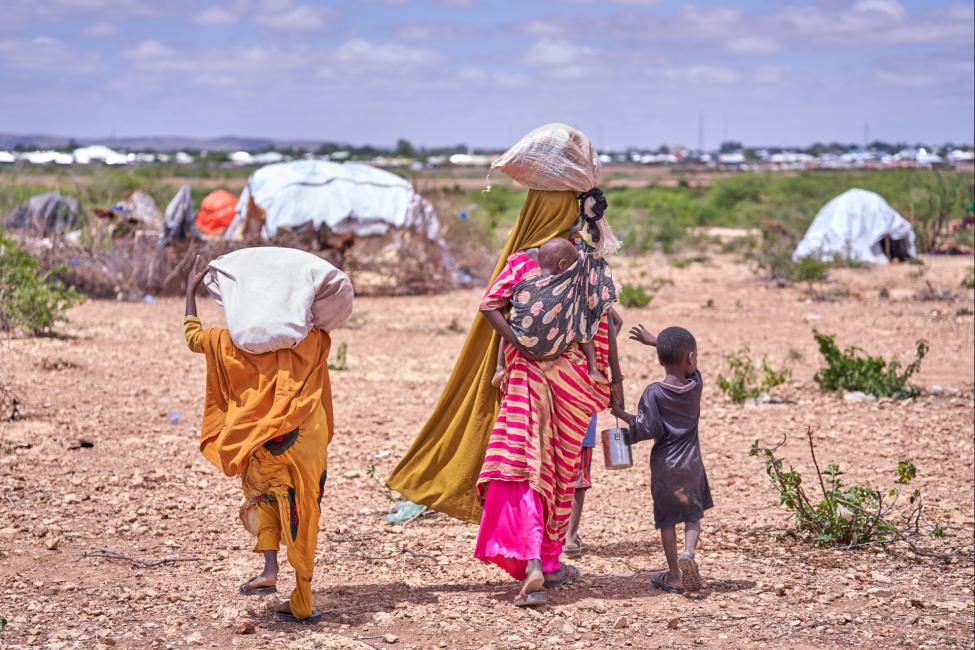Tackling Climate-Induced Migration in Africa: Innovative Solutions Unveiled
Featured Image: IOM
On April 17, 2024, the Refugee Law Initiative at the University of London, in partnership with the Centre for Migration Studies at the University of Ghana, the African Centre for Migration Society in South Africa, and the African Academy of Migration Research, held the third session of the Refocus: An Online Summer Forced Migration in Africa Workshop Series.
The session, themed “Emerging Regional (Forced) Migration Patterns in Africa Part 2: Evolving Migration Governance,” was chaired by Dr. Nicholas James Maple, a Lecturer in Refugee Studies at the Refugee Law Initiative whose research interests span a multidisciplinary approach, focusing on examining refugee and migrant displacement in Africa and Latin America.
A highlight of the event was a senior lecturer in the Department of Geography within the College of Social Sciences at the University of Dar es Salaam, Prof. Opportuna Kweka's presentation, titled "Climate Change and its Nexus with Forced Displacement: Case Studies of Tanzania." Prof. Kweka, Chair of the Research Chair on Forced Displacement at the University of Dar es Salaam, provided crucial insights into the complex challenges of climate-induced displacement in East Africa.
Prof. Kweka emphasized the importance of multidisciplinary collaboration in addressing displacement issues, noting the need for integrated approaches to conflict-induced, climate-disaster-induced, and project-driven displacement. He pointed out a significant challenge: the disjointed efforts of humanitarian and climate change funds, which often work in isolation, thus impeding effective responses to the intertwined issues of displacement and environmental degradation.
Prof. Kweka highlighted the severe impact of drought on nomadic pastoralists in Tanzania, which leads to widespread migration in search of resources. This situation results in conflicts and gender-based violence, further worsening the conditions of vulnerable communities and stressing the need for comprehensive interventions. Additionally, urban flooding, particularly in Dar es Salaam, poses another critical issue as recurring floods force residents to relocate temporarily, disrupting social and economic stability.
In his concluding remarks, Prof. Kweka offered several recommendations for effectively addressing climate-induced displacement. These included prioritizing community agencies, supporting positive adaptation strategies, promoting affordable clean energy and sustainable land management practices, and fostering collaboration between environmental and agricultural sectors to tackle the root causes of displacement.
The session also featured enlightening presentations by other distinguished speakers. Prof. Chidi Anselm Odinkalu, Professor of Practice in International Human Rights Law at the Fletcher School, delved into the challenges faced by regional institutions in Africa's response to forced migration. "Regional institutions often struggle with inadequate resources and fragmented policies, which hinder a unified response to forced migration," Prof. Odinkalu remarked. He stressed the need for more robust institutional frameworks and better resource allocation to address these issues effectively.
Sarah Doyel, North Africa Project Manager at the Mixed Migration Centre (MMC) in Tunis, discussed "Africa-Europe Cooperation on Migration and the Growing Influence of the European Union in Tunisia and Libya." Doyel highlighted the complexities of migration dynamics between Africa and Europe, noting, "The EU's influence in North Africa has grown significantly, shaping migration policies and practices in countries like Tunisia and Libya." She emphasized the importance of balanced cooperation that respects the sovereignty and specific needs of African nations while addressing migration challenges.
These discussions underscored the urgent need for innovative, collaborative, and comprehensive strategies to address the challenges of forced migration in Africa, with a particular emphasis on climate-induced displacement. The insights provided by Prof. Kweka, Prof. Odinkalu, and Doyel highlighted the importance of integrated approaches, regional cooperation, and the inclusion of diverse perspectives to develop effective and sustainable solutions.
These discussions highlighted the urgent need for innovative, collaborative, and comprehensive strategies to address the challenges of forced migration in Africa, with a particular emphasis on climate-induced displacement.

